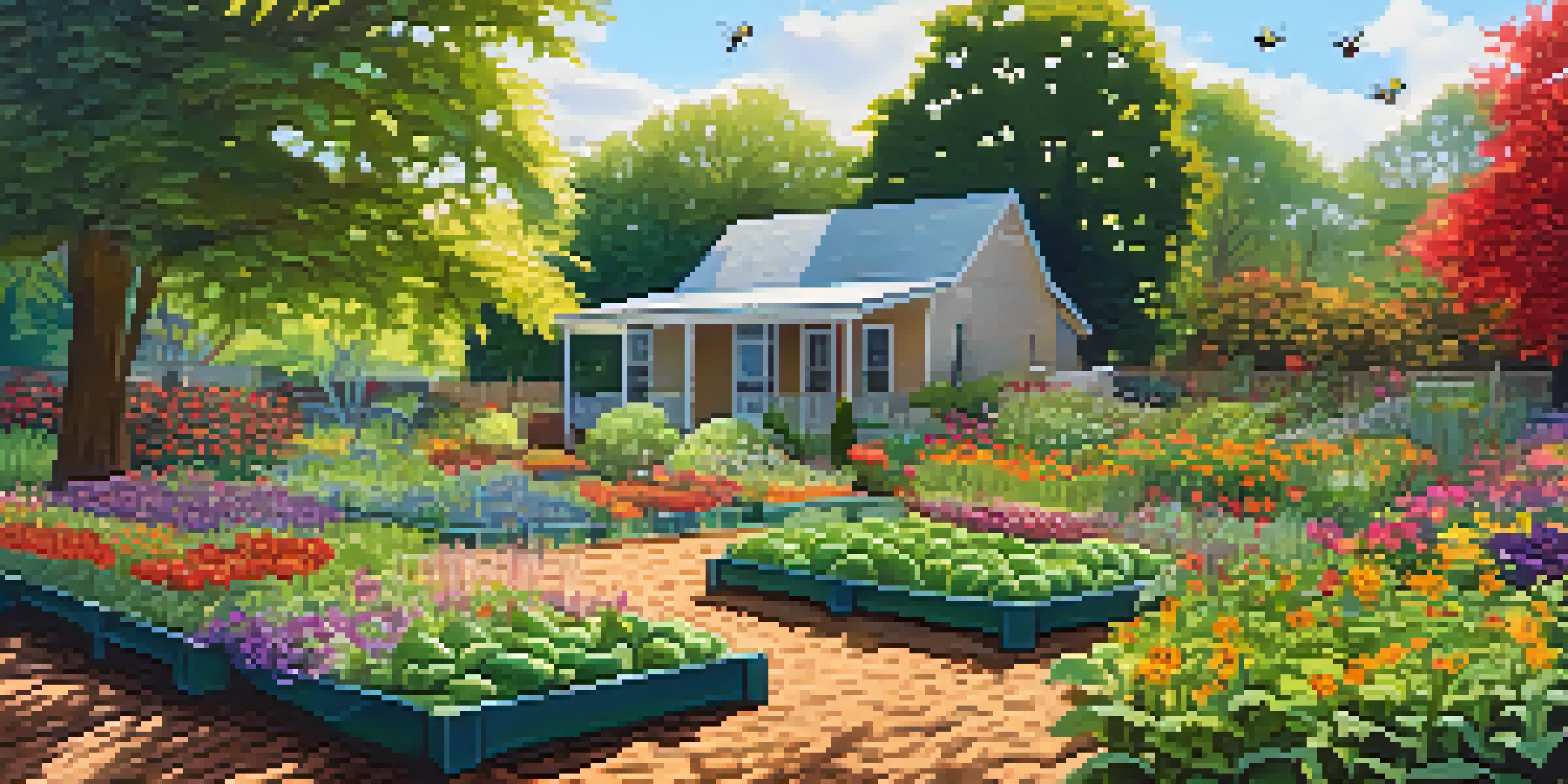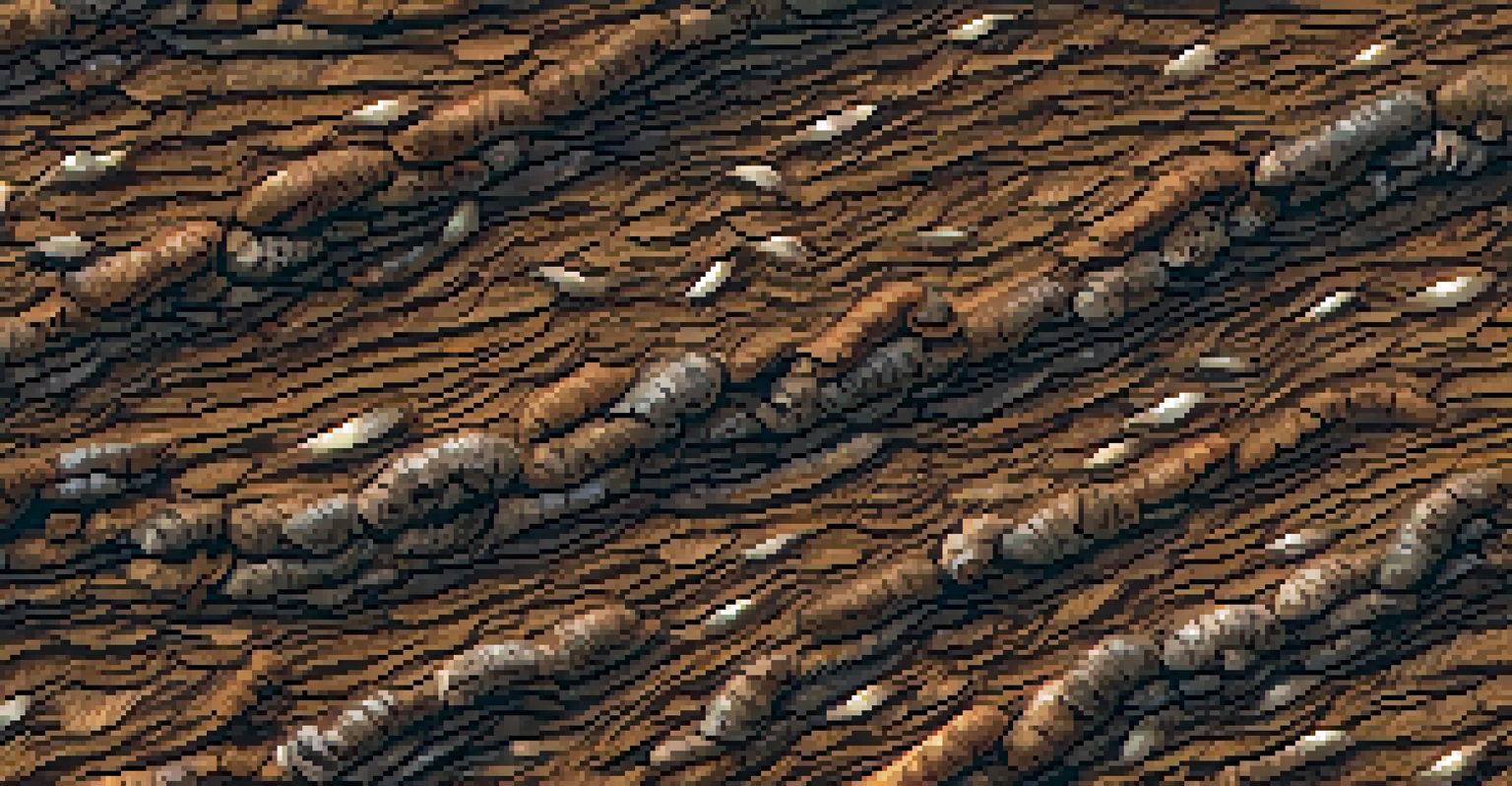Organic Mulching: Benefits and Best Practices for Gardens

What is Organic Mulching and Why Use It?
Organic mulching involves covering the soil in your garden with natural materials like leaves, straw, or wood chips. This technique serves multiple purposes, from moisture retention to weed suppression. By using organic materials, you not only enhance the beauty of your garden but also improve its health and productivity.
Mulch is the gardener's best friend, a protective blanket that nurtures the soil while suppressing the weeds.
One of the main benefits of organic mulch is its ability to conserve moisture. In hot weather, mulch acts as a barrier, reducing evaporation from the soil. This means your plants can thrive even during dry spells without requiring constant watering.
Additionally, organic mulch breaks down over time, enriching the soil with nutrients. As it decomposes, it feeds beneficial microbes and worms, which in turn help your plants grow stronger. This symbiotic relationship is a win-win for both your garden and the environment.
The Environmental Benefits of Organic Mulching
Using organic mulch is not just good for your garden; it's also beneficial for the environment. By recycling materials like fallen leaves or grass clippings, you're reducing waste that would otherwise go to landfills. This practice promotes a more sustainable way of gardening.

Furthermore, organic mulching helps improve soil structure and prevents erosion. When heavy rains occur, mulch acts as a protective layer, absorbing water and allowing it to penetrate the soil rather than washing it away. This is particularly important in areas prone to flooding or heavy runoff.
Benefits of Organic Mulching
Organic mulching conserves moisture, enriches soil, and supports beneficial microbes, leading to healthier plants.
Lastly, organic mulch can attract beneficial insects and wildlife. By providing a habitat for insects like ladybugs and bees, you're supporting a balanced ecosystem in your garden. This biodiversity helps control pests naturally, reducing the need for chemical interventions.
Choosing the Right Organic Mulch for Your Garden
Selecting the right type of organic mulch is crucial for maximizing its benefits. Common options include shredded bark, straw, grass clippings, and leaves. Each type has unique properties and advantages, so consider your garden's specific needs when making your choice.
The soil is the foundation of life, and healthy soil leads to healthy plants.
For instance, wood chips are excellent for perennial gardens as they break down slowly, providing long-term benefits. On the other hand, straw is lighter and works well in vegetable gardens, allowing for easy planting and access. Think about your garden's layout and the plants you’re growing to find the best fit.
It's also important to consider the source of your mulch. If you're using materials from your yard, ensure they're free from pesticides and diseases. If you're purchasing mulch, opt for certified organic products that guarantee they're safe for your garden and the surrounding ecosystem.
How to Apply Organic Mulch Effectively
Applying organic mulch may seem straightforward, but there are best practices to ensure its effectiveness. Start by preparing your garden bed: remove any weeds and debris to create a clean surface. This not only helps the mulch do its job but also prevents any unwanted growth from poking through.
When applying mulch, aim for a thickness of about 2-4 inches. Too little won't provide the benefits you're looking for, while too much can suffocate plants. Make sure to keep the mulch a few inches away from the stems of your plants to prevent rot and encourage airflow.
Environmental Advantages
Using organic mulch reduces waste, prevents erosion, and fosters biodiversity by attracting beneficial insects.
It's also wise to refresh your mulch layer annually. As organic materials decompose, they lose their effectiveness. By topping off your mulch each year, you maintain its protective qualities and ensure your garden continues to thrive throughout the seasons.
Common Mistakes to Avoid with Organic Mulching
While organic mulching is beneficial, there are common pitfalls to watch out for. One major mistake is using too much mulch, which can lead to moisture retention issues and root rot in plants. Always stick to the recommended thickness to keep your plants healthy.
Another mistake is neglecting to weed before applying mulch. If you cover existing weeds with mulch, you're merely hiding the problem. Those persistent weeds will eventually break through, competing with your plants for nutrients and water.
Lastly, be cautious with the type of mulch you choose. Some materials, like pine needles, can acidify the soil, which might not be suitable for all plants. Always research the specific needs of your garden and adjust your mulch choices accordingly to avoid any negative impacts.
The Role of Organic Mulch in Soil Health
One of the most significant advantages of organic mulching is its positive impact on soil health. As mulch decomposes, it adds organic matter to the soil, which improves its structure and nutrient content. Healthy soil is the foundation of a thriving garden, supporting plant growth and resilience.
Organic matter helps soil retain moisture and improves drainage, creating a balanced environment for root development. This means your plants can access water and nutrients more effectively, leading to increased growth and productivity. It’s like giving your plants a nutrient-rich sponge to thrive in!
Effective Mulch Application Tips
Proper application and maintenance of organic mulch, including thickness and annual replenishment, ensure its effectiveness in your garden.
Additionally, healthy soil fosters beneficial microorganisms and earthworms that play crucial roles in nutrient cycling. These little helpers break down organic materials, making nutrients available for your plants. This natural process ensures your garden remains vibrant and can withstand challenges like pests and disease.
Maintaining Your Organic Mulch Throughout the Seasons
Maintaining your organic mulch is an ongoing process that varies with the seasons. In spring, check for any areas that may need replenishing, especially after winter’s harsh conditions. If your mulch has thinned out, adding a fresh layer will help protect new growth and retain moisture as temperatures rise.
During the summer months, keep an eye on your mulch for signs of compaction or decomposition. If it starts to look too thin or breaks down significantly, it’s time for a refresh. This is also a good time to monitor your plants for pests, as mulch can sometimes provide hiding spots for unwanted critters.

In fall, consider collecting fallen leaves to use as mulch. This not only recycles natural materials but also adds a beautiful touch to your garden. As you prepare for winter, a thicker layer of mulch can help insulate the soil, protecting it from freezing temperatures and ensuring a healthy environment for your plants come spring.